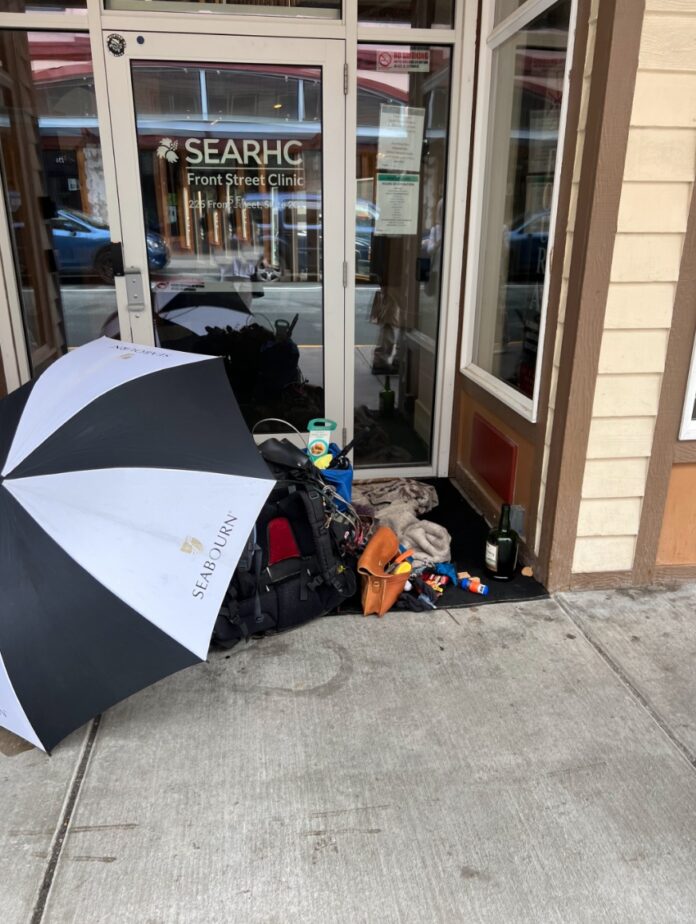By WIN GRUENING
In January, 2017, I penned a Must Read Alaska column defending then-Mayor Koelsch’s sponsorship of an anti-camping ordinance needed to address public health and safety concerns caused by a growing homeless population downtown.
Prior to that, I had written a column supporting Housing First in their effort to raise awareness and funding for a housing solution for the chronically homeless in Juneau. Since 2015, tens of millions of dollars have been spent under that program and almost 100 permanent housing units for the homeless have been built or are slated for construction in Juneau.
Similar projects have been constructed in Anchorage and Fairbanks.
Much has happened since then, but the homeless challenge remains, and, some would argue, it has gotten even worse. Going forward, is it time to consider a different approach?
Juneau is not alone in tackling this dilemma. San Francisco, Portland, and Seattle, come to mind as cities that have poured billions of dollars into non-profit entities that have offered housing, counseling, treatment programs, and endless studies.
City police forces have been overwhelmed by so many citizen complaints of panhandling and shoplifting that many calls go unanswered. Downtown areas that were once thriving office centers and shopping meccas are now largely deserted at night, beset by crime, rampant drug use, and public disturbances.
Due to safety concerns, Microsoft, the crown jewel of Seattle’s business community, recently canceled a nation-wide conference in Seattle that hosts over 4,500 attendees and would have given the city an economic boost in the hundreds of millions of dollars.
In Alaska, Anchorage continues to make headlines with its homeless problems that to some have reached crisis proportions. Recently, after the police cleared a massive homeless encampment in a public park, vagrants there set multiple fires in protest.
In Juneau, a similar action to clear unlawful camping on public property didn’t result in violence. But the action was necessary to address the enormous amount of trash being generated, open drug use, vandalism, and generally unsafe conditions prevalent in the camp and nearby neighborhood.
Some blame the increase in homeless problems on the decriminalization of petty crime and drugs as well as lax law enforcement. This is unfair to our police who don’t make those decisions but are forced to deal with the impacts of policies enacted by elected officials.
Juneau’s primary emergency shelter and soup kitchen, the Glory Hall (now located in the Mendenhall Valley) is also sometimes unfairly blamed. It has provided meals and other critical services to the homeless since 1981. It operates as a nonprofit organization, relying on community donations and grants. While homeless individuals tend to congregate around the Glory Hall facility, anyone under the influence of drugs or alcohol is not eligible to utilize their services.
The homeless deserve compassion and may be homeless due to circumstances beyond their control. But they are not helpless and must be willing to respect municipal and private property and not be a threat to the general public.
What seems clear is that just providing housing and throwing more money at some of the same solutions hasn’t worked.
Certain states have already reached that conclusion and have begun channeling funding away from subsidized housing programs like Housing First. These states believe that programs where recipients aren’t held accountable don’t get results.
Housing First serves chronically homeless individuals who are high utilizers of emergency and public safety services. They are offered permanent housing but are not required to be sober or participate in treatment to qualify. Instead, the model uses a harm reduction approach, offering optional on-site services such as medical care, counseling, and substance use treatment.
Initially, this approach did take homeless people off the street. But with Juneau’s population declining, why is the community’s homeless population increasing? Are individuals coming from other towns in Southeast that lack homeless services? Are the community’s generous and compassionate programs turning into magnets?
Florida, Georgia, and Utah, for example, are now taking steps to fund policies built on rehabilitation and behavioral health treatment, aiming to free the homeless from government support. More states are now opting for transitional housing and other treatment-oriented programs.
Perhaps it’s time for Juneau and other communities in Alaska to focus their efforts there.
After retiring as the senior vice president in charge of business banking for Key Bank in Alaska, Win Gruening became a regular opinion page columnist for the Juneau Empire. He was born and raised in Juneau and graduated from the U.S. Air Force Academy in 1970. He is involved in various local and statewide organizations.
